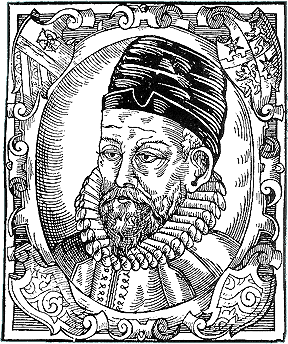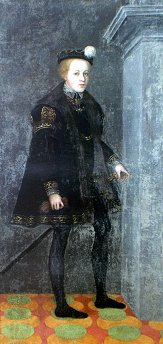Last Rosenberg: Peter Wok von Rosenberg
 Peter Wok von Rosenberg
was born on the 1st of October 1539 to Anna von
Rosenberg, neé von Rogendorf and Jošt III von Rosenberg. When
his father died in 1539, Peter V von Rosenberg took over the
administration of the Rosenberg dominion and the guardianship of
Jošt´s descendants. In accordance with his decree, Ann´s children
were taken away from their mother and thus Peter Wok spent his
childhood with his aunt Ann von Rosenberg of Hradec at the castle
of Jindřichův Hradec. After the death of Peter V in 1545, Ann
resumed the upbringing of her children and returned to Český
Krumlov. Peter Wok´s opinions were formed under the influence of
Lutheran spirit brought to Bohemia by the first wife of his elder
brother Wilhelm von
Rosenberg, Katherine of Brunschwig which led to Peter
abandoning the Catholic faith. He acquired his first political
experience at the court of a future Czech king, Maxmilian von
Habsburg. On the invitation of William of Orange he made a
chivalrous ride to the Netherlands and England at the end of the
year 1562 and he was received there by Queen Elizabeth I. This
study journey influenced the process of political and religious
maturation of Peter Wok in a vital way. For his place of residence
he chose the castle of Bechyně which he had rebuilt in Renaissance
style according to an Italian pattern. In the reconstruction works
at the castle the Italian builder Baldassare Maggi of Arogn and
painters Gabriel de Blonde and Bartoloměj Beránek - Jelínek
participated, both also working for Wilhelm von Rosenberg´s
brother. In February 1580 Peter Wok married Katherine of Ludanice
whose emotional and mental health were rather undermined, because
as an orphan she had to look after the disputes over the family
heritage.
Peter Wok von Rosenberg
was born on the 1st of October 1539 to Anna von
Rosenberg, neé von Rogendorf and Jošt III von Rosenberg. When
his father died in 1539, Peter V von Rosenberg took over the
administration of the Rosenberg dominion and the guardianship of
Jošt´s descendants. In accordance with his decree, Ann´s children
were taken away from their mother and thus Peter Wok spent his
childhood with his aunt Ann von Rosenberg of Hradec at the castle
of Jindřichův Hradec. After the death of Peter V in 1545, Ann
resumed the upbringing of her children and returned to Český
Krumlov. Peter Wok´s opinions were formed under the influence of
Lutheran spirit brought to Bohemia by the first wife of his elder
brother Wilhelm von
Rosenberg, Katherine of Brunschwig which led to Peter
abandoning the Catholic faith. He acquired his first political
experience at the court of a future Czech king, Maxmilian von
Habsburg. On the invitation of William of Orange he made a
chivalrous ride to the Netherlands and England at the end of the
year 1562 and he was received there by Queen Elizabeth I. This
study journey influenced the process of political and religious
maturation of Peter Wok in a vital way. For his place of residence
he chose the castle of Bechyně which he had rebuilt in Renaissance
style according to an Italian pattern. In the reconstruction works
at the castle the Italian builder Baldassare Maggi of Arogn and
painters Gabriel de Blonde and Bartoloměj Beránek - Jelínek
participated, both also working for Wilhelm von Rosenberg´s
brother. In February 1580 Peter Wok married Katherine of Ludanice
whose emotional and mental health were rather undermined, because
as an orphan she had to look after the disputes over the family
heritage.
 Peter Wok assumed the
reigns of government only after the death of his elder brother
Wilhelm in 1592. As his marriage to Katherine of Ludanice did not
bring him any descendant, and the debts of the aristocratic family
were not insignificant, plus the pressure of his creditors became
stronger, the ruler was forced to solve the financial affairs of
his family fundamentally. In 1596 the last Rosenberg sold some of
the marginal mansions like Bechyně or Stráž. One year later he
handed over the mansion and castle of Rosenberg to his nephew
Jan
Zrinský of Seryn - and after his death, also Třeboň and Vyšší
Brod because he did not want the traditional family estates to fall
into a stranger´s hands. Although Peter Wok accepted the idea of
handing over the family residence only with difficulty, finally, on
the 24th of October 1601, he consented to the approval of the
definitive agreement on the sale of the mansion of Český Krumlov to
emperor Rudolf II von
Habsburg. The last Rosenberg left Český Krumlov after the death
of his wife Katherine of Ludanice in 1602. His new residential
place was the castle of Třeboň where he spent the rest of his
life.
Peter Wok assumed the
reigns of government only after the death of his elder brother
Wilhelm in 1592. As his marriage to Katherine of Ludanice did not
bring him any descendant, and the debts of the aristocratic family
were not insignificant, plus the pressure of his creditors became
stronger, the ruler was forced to solve the financial affairs of
his family fundamentally. In 1596 the last Rosenberg sold some of
the marginal mansions like Bechyně or Stráž. One year later he
handed over the mansion and castle of Rosenberg to his nephew
Jan
Zrinský of Seryn - and after his death, also Třeboň and Vyšší
Brod because he did not want the traditional family estates to fall
into a stranger´s hands. Although Peter Wok accepted the idea of
handing over the family residence only with difficulty, finally, on
the 24th of October 1601, he consented to the approval of the
definitive agreement on the sale of the mansion of Český Krumlov to
emperor Rudolf II von
Habsburg. The last Rosenberg left Český Krumlov after the death
of his wife Katherine of Ludanice in 1602. His new residential
place was the castle of Třeboň where he spent the rest of his
life.
 Unlike his brother
Wilhelm, Peter Wok did not take care of his political career much
but he developed his passion for collecting through his whole life.
He established an extensive Rosenberg library, the administration
of which was taken care of by the librarian and archivist Václav
Březan. The last diplomatic activity of Peter Wok was the
solution of difficult situation in 1611 when the troops of the
Passau Bishop invaded Bohemia and seized Český Krumlov where they
camped which rather devastaded the surrounding area.
Unlike his brother
Wilhelm, Peter Wok did not take care of his political career much
but he developed his passion for collecting through his whole life.
He established an extensive Rosenberg library, the administration
of which was taken care of by the librarian and archivist Václav
Březan. The last diplomatic activity of Peter Wok was the
solution of difficult situation in 1611 when the troops of the
Passau Bishop invaded Bohemia and seized Český Krumlov where they
camped which rather devastaded the surrounding area.
Peter Wok was forced to buy the troops out. Peter Wok von Rosenberg died on the 6th of November 1611 at the castle of Třeboň and his corpse was placed in the Rosenberg vault in Monastery in Vyšší Brod.
(mj)

|

|

